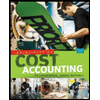Genuine Spice Inc. began operations on January 1 of the current year. The company produces 8-ounce bottles of hand and body lotion called Eternal Beauty. The lotion is sold wholesale in 12-bottle cases for 100 per case. There is a selling commission of 20 per case. The January direct materials, direct labor, and factory overhead costs are as follows: DIRECT MATERIALS Cost Behavior Units per Case Cost per Unit Direct Materials Cost per Case Cream base Variable 100 ozs. 0.02 2.00 Natural oils Variable 30ozs. 0.30 9.00 Bottle (8-OZ-) Variable 12 bottles 0.50 6.00 17.00 DIRECT LABOR Department Cost Behavior Time per Case Labor Rate per Hour Direct Labor Cost per Case Mixing Variable 20 min. 18.00 6.00 Filling Variable 5 14.40 1.2 25 min. 7.20 FACTORY OVERHEAD Cost Behavior Total Cost Utilities Mixed 600 Facility lease Fixed 14,000 Equipment depreciation Fixed 4,300 Supplies Fixed 660 19,560 Part ABreak-Even Analysis The management of Genuine Spice Inc. wishes to determine the number of cases required to break even per month. The utilities cost, which is part of factory overhead, is a mixed cost. The following information was gathered from the first six months of operation regarding this cost: Month Case Production Utility Total Cost January 500 600 February 800 660 March 1,200 740 April 1,100 720 May 950 690 June 1,025 705 Instructions 1. Determine the fixed and variable portions of the utility cost using the high-low method. 2. Determine the contribution margin per ease. 3. Determine the fixed costs per month, including the utility fixed cost from part (1). 4. Determine the break-even number of cases per month. Part BAugust Budgets During July of the current year, the management of Genuine Spice Inc. asked the controller to prepare August manufacturing and income statement budgets. Demand was expected to be 1,500 cases at 100 per case for August. Inventory planning information is provided as follows: Finished Goods Inventory: Cases Cost Estimated finished goods inventory, August 1 300 12,000 Desired finished goods inventory, August 31 175 7,000 Materials Inventory: Cream Base (ozs.) Oils (ozs.) Bottles (bottles) Estimated materials inventory, August 1 250 290 600 Desired materials inventory, August 31 1,000 360 240 There was negligible work in process inventory assumed for either the beginning or end of the month; thus, none was assumed. In addition, there was no change in tile cost per unit or estimated units per case operating data from January. Instructions 5. Prepare the August production budget. 6. Prepare the August direct materials purchases budget. 7. Prepare the August direct labor budget. Round the hours required for production to the nearest hour. 8. Prepare the August factory overhead budget. 9. Prepare the August budgeted income statement, including selling expenses. Part CAugust Variance Analysis During September of the current year, the controller was asked to perform variance analyses for August. The January operating data provided the standard prices, rates, times, and quantities per case. There were 1,500 actual cases produced during August, which was 250 more cases than planned at the Beginning of the month. Actual data for August were as follows: Actual Direct Materials Price per Unit Actual Direct Materials Quantity per Case Cream base 0.016 per oz. 102 ozs. Natural oils 0.32 per oz. 31 ozs. Bottle (8 oz.) 0.42 per bottle 12.5 bottles Actual Direct Labor Rate Actual Direct Labor Time per Case Mixing 18.20 19.50 min. Filling 14.00 5.60 min. Actual variable overhead 305.00 Normal volume 1,600 cases The prices of the materials were different than .standard due to fluctuations in market prices. The standard quantity of materials used per case was an ideal standard. The Mixing Department used a higher grade labor classification during the month, thus causing the actual labor rale to exceed standard. The Filling Department used a lower grade labor classification during the month, thus causing the actual labor rate to be less titan standard. Instructions 10. Determine and interpret the direct materials price and quantity variances for the three materials. 11. Determine and interpret the direct labor rate and time variances for the two departments. Round hours to the nearest hour. 12. Determine and interpret the factory overhead controllable variance. 13. Determine and interpret the factory overhead volume variance. 14. Why are the standard direct labor and direct materials costs in the calculations for parts (10) and (11) based on the actual 1,500-case production volume rather than the planned 1,250 cases of production used in the budgets for parts (6) and (7)?











